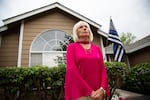
Dr. Alan Melnick addresses the media on March 17, 2020 about the deaths of an elderly couple by coronavirus. The deaths were the first two in Southwest Washington.
Troy Brynelson / OPB
For four uninterrupted minutes Wednesday, an attorney representing Clark County performed a live reading of state statutes governing local health boards.
The recital came at the urging of Councilor Eileen Quiring O’Brien, who sits on the county’s health board with her fellow elected councilors. She had just pitched a proposal to require ID checks for any adults accompanying minors to vaccine appointments.
Just prior, attorney Amanda Migchelbrink told Quiring O’Brien such a move was not within their power.
“Either we are completely powerless, which sounds like what you’re advising, or we do have some authority as a board of health to ask our public health officer to do certain things,” Quiring O’Brien said.
While the meeting ended with no new policies put forward, the councilors devised a plan to consult with the county’s top attorneys for legal advice about just how far the health board’s authority can go. It was a plan backed by two other councilors, Karen Bowerman and Gary Medvigy, creating a majority opinion.
In doing so, more questions could be brewing about the role of elected officials in the day-to-day work of addressing public health matters.
Quiring O’Brien’s made two proposals in the meeting. She wanted to ensure vaccine providers went to greater lengths to give written disclaimers about the vaccines’ emergency use authorization. And she wanted vaccine providers to take more steps to ensure minors had parental consent.
That second proposal, she said, stemmed from a concern that some minors could try to get vaccinated against their parents’ wishes. Dr. Alan Melnick, the county’s public health officer, attempted to address that concern and spent the second half of the nearly two-hour meeting going back and forth with the trio of councilors.

Eileen Quiring O'Brien stands outside her home in late August 2020. The board chair of the Clark County Council clashed this week with public health officials over how the county should handle vaccinating minors.
Troy Brynelson / OPB
Melnick told the board that, in the majority of cases, anyone who is under 18 years old must have a parent or guardian’s signature. Minors who are 16 or 17 years old do not need that adult present during the vaccine.
In some cases, minors can receive medical care without consent from a parent or guardian if their circumstances show them to be mature enough, a rule stemming from a 1960s Washington Supreme Court case.
Clark County Public Health spokesperson Marissa Armstrong said the county is not seeing minors seeking vaccinations without consent. However, she could not say it has never happened.
“Any minors that we are vaccinating, they are coming with a parent with them or they’re coming with a consent form,” Armstrong said. “It’s not an issue that we’re encountering.”
Still, the councilors said they wanted more done to ensure providers are asking for adults to be present with verifiable ID. Melnick noted that an adult with an ID isn’t necessarily proof of parentage or guardianship. Some parents may not have identification, he added, such as first-generation immigrants.
Melnick and the councilors also disagreed about the safety of the vaccine and how transmissible COVID-19 is in minors.
The conversation ultimately centered on whether the board could direct Melnick to make the policy changes discussed. Medvigy, a former attorney, said he supported getting more legal advice, including from the county’s elected prosecutor.
“These are important issues,” Medvigy told OPB. “Otherwise, why am I sitting on the board of health? If it’s just a meeting — a public service announcement of the data — maybe I’ll Zoom in, maybe I won’t. But if I can’t have a say, use my own intellect and decision-making authority, why am I there?”
Quiring O’Brien did not respond to requests for comment.
The power of Washington’s local boards of health has been a question wracking communities throughout the COVID-19 pandemic. As the public sought answers and plans of action, boards of health throughout the state became pitched areas of debate.
Last November, the Spokane County Health Board fired its health officer. Dr. Bob Lutz maintained he was fired in retaliation for taking a cautious approach during the burgeoning pandemic, according to The Spokesman-Review.
A month later, the Pierce County Council tried to dissolve its joint health department with the city of Tacoma so the health department would answer solely to the County Council, reported The News-Tribune in Tacoma.
That politicking eventually led state legislators to rewrite laws around the board of health, said Rep. Marcus Riccelli, D-Spokane. Riccelli sponsored HB 1152 which, among other things, requires local boards of health to have as many non-elected members as elected members. The non-elected members must meet certain criteria, such as having medical expertise or having lived health care experience.
“It just brings that engagement and expertise to the table, which I think is important,” Riccelli told OPB. Gov. Jay Inslee signed the bill May 10.
However, some counties — like Clark — aren’t affected by the bill. A board could stay entirely run by elected officials if the county has a public health advisory committee. The Clark County Public Health Advisory Council meets for two hours every two months.
Riccelli said he felt like Clark County’s board of health ideas seemed to be creating barriers for vaccines, and was interested to see what legal advice may come.
“I believe this is out of their scope, but I guess this is a good test case to understand that,” Riccelli said.